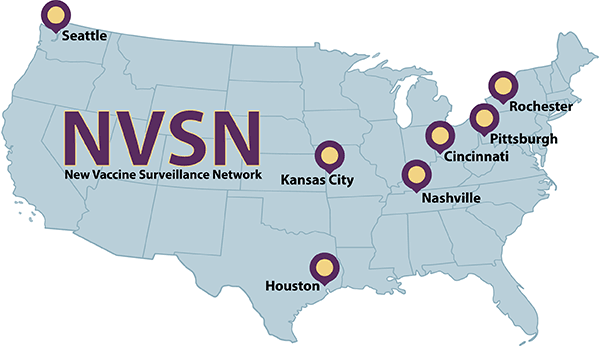At a glance
How CDC Uses NVSN Data
NVSN data are used to:
- Evaluate effectiveness of new pediatric vaccines and prevention products for illnesses caused by common childhood viruses, including products for rotavirus, norovirus, influenza, COVID-19, and respiratory syncytial virus (RSV).
- Determine the cause and burden of acute viral respiratory and gastrointestinal hospitalizations in children.
- Conduct vaccine cost-analyses studies for norovirus, RSV, and influenza.
- Monitor and describe the clinical severity and epidemiology of illness caused by these pathogens for public health response activities.
View NVSN Data
Surveillance Activities
NVSN is an active, prospective, population-based surveillance network for acute respiratory illness and acute gastroenteritis in children <18 years of age across seven pediatric health systems. The network collects data on children in the outpatient, emergency department (ED), and hospital settings through parent interviews, medical chart reviews, and universal specimen testing. Vaccination status is verified in state immunization information systems and with primary care providers.
NVSN has conducted surveillance for pediatric acute respiratory illnesses from 2000 to 2009, and 2015 to the present. Pediatric acute gastroenteritis surveillance has been continuous since 2009.

Acute respiratory illness (ARI) surveillance includes RSV, SARS-CoV-2, influenza virus, adenovirus, parainfluenza viruses 1-4, seasonal human coronaviruses, human metapneumovirus, and rhinoviruses/enteroviruses (RV/EV), including enterovirus-D68. Surveillance was expanded to include multisystem inflammatory syndrome in children (MIS-C) in 2022.
Acute gastroenteritis (AGE) surveillance includes rotavirus and norovirus.
